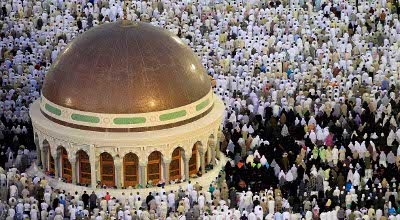Muslim Mecca Pilgrimage Opens Evangelism Doors
About 2.5 million visitors are descending on Mecca, Saudi Arabia today for the beginning of Hajj.
“Hajj literally means ‘to visit’ or ‘to come back.’ It’s a pilgrimage,” says Fouad Masri with Crescent Project. “It’s a ritual that Muslims have to do once in a lifetime, for those who are able.”
The 2011 pilgrimage takes place Friday through Wednesday. It is a demonstration of the solidarity of the Muslim people and is the largest gathering of people in the world. Masri explains, “In Hajj, you are going there to show God that you’ve performed exactly the rituals, exactly as the imam says, and then you hope that God saves you from your sins.”
The pilgrimage is the fifth pillar of Islam and is laden with tradition. The practice can be traced back to Abraham. Millions of pilgrims walk from Mecca to Mina to the Plain of Arafat to stand near the Mount of Mercy and ask Allah for forgiveness. Pilgrims then walk back to Mina to throw pebbles at pillars that represent the temptations of Satan.
The symbolic animal slaughter of Eid al Adha is followed by a trip back to Mecca for a visit to the most sacred site in Islam. Pilgrims drink from a holy stream before returning to Medina to finish the journey.
While millions are participating, not all understand the purpose of the rituals. Masri notes that “the Hajj becomes a ritual to satisfy the need for salvation from their sin. That’s where it distracts them from getting to know about Jesus.”
It’s a great opportunity for Christians to ask questions, especially after al Adha. “They’ll tell you the story then say, ‘You know, the son of Abraham was redeemed, was released.’ They’ll tell you ‘Yes.’ Then we’ll come in and say, ‘That’s how we are released from our sin, because now Jesus is our redeemer. He’s our Savior,'” Masri explains.
This can bridge an introduction of Christ, especially in light of the upheaval during the Arab Spring. Muslims have taken a sometimes deadly stand against long-standing governments. They desire new freedoms and peace. “Every time you have a Muslim in your circle of influence, create a friendly environment where there’s trust, where there’s respect, where your Muslim friend feels comfortable asking questions,” Masri says. “Then when you use the tools, they’re exciting because you use them in a way to keep the discussion on Jesus and the Bible.”
Masri acknowledges that it can be intimidating for Christians to share their faith with Muslims, but there is no better time to start learning how to do it. That’s why they have resources available like the Oasis Conference, training DVDs and books. “The core discussion is how to build bridges to understanding who Christ is and that the Bible is trustworthy.”
As doors open throughout the Middle East and North Africa, however briefly, believers should be ready with answers to the spiritual questions introduced by Hajj.














































